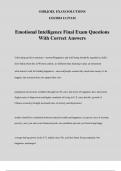©SIRJOEL EXAM SOLUTIONS
12/3/2024 11:27AM
Emotional Intelligence Final Exam Questions
With Correct Answers
Cultivating positive emotions - answer✔happiness and well-being should be regarded as skills,
don't think about this in Western culture, no different than learning to play an instrument
what doesn't work for finding happiness - answer✔people assume they need more money to be
happier, but research does not support that view
population has become wealthier through last 50 years, but levels of happiness have decreased
(higher rates of depression and higher standards of living in U.S. since the 60s, growth of
Chinese economy brought increased rates of anxiety and depression)
studies found low correlation between material wealth and happiness, except in cases of extreme
poverty, once you meet your financial goals, new problems prevent you from being happy
average buying power in the U.S. tripled since 50s, and also better living standards, but
happiness unchanged
, ©SIRJOEL EXAM SOLUTIONS
12/3/2024 11:27AM
looking for happiness in the wrong direction - answer✔ineffectual, can produce negative effects,
people who just want to make money experience more distress, more likely to be
depressed/anxious, less healthy, less vital
college freshman who had materialistic aspirations more likely to have mental disorders by 37
thinking about money causes people to be less warm/caring towards others
success does not bring happiness
happy people tend to... - answer✔have high self-esteem, be optimistic/outgoing/agreeable, have
close friendships/satisfying marriage, have work and leisure that engage their skills, have a
meaningful religious faith/spiritual life, sleep well, exercise, subjective health
happiness is not related to... - answer✔age, physical attractiveness, gender, educational level,
parenthood, objective health
top factors influencing happiness - answer✔social relationships (single biggest predictor of
happiness, quality not quantity), optimism, self-esteem/self-acceptance, locus of control, sense of
meaning/purpose to life, sleep, exercise
, ©SIRJOEL EXAM SOLUTIONS
12/3/2024 11:27AM
optimism: neurophysiological bases - answer✔the right hemisphere is associated with
pessimism, left hemisphere associated with positive emotions
early research showed hemispheric dominance developed in early childhood and doesn't change,
but recent studies indicate there are effective ways of changing it, such as meditation
meditation and hemispheric dominance - answer✔EEG studies by Richard Davison, mindfulness
meditation associated with increased left frontal activity, long term meditators show high degrees
of left frontal activity, an elderly Tibetan monk showed greatest, senior monk showed to have
highest level ever, other studies show less extensive meditation is associated with a significant
shift in hemispheric dominance, degree of shift correlates with enhanced immune system
mindfulness in daily life - answer✔mindfulness practice is about a way of being that extends to
how we engage in all of our daily activities, it's knowing you are exactly where you should this
moment, appreciating this moment, engaging in activities with full focus of attention, e.g.
walking meditation, shake off all worries/anxieties, don't think of the future or past, just enjoy
the present moment, don't rush through washing dishes or it will become an unpleasant task and
we will be incapable of enjoying other things, you cannot just selectively focus on pleasant tasks,
find the meaning of life in simple acts
goal-oriented culture - answer✔in the west we are very goal-oriented, we know where we want
to go, we are very directed in getting there, but we often forget to enjoy ourselves along the way
, ©SIRJOEL EXAM SOLUTIONS
12/3/2024 11:27AM
mindful eating` - answer✔sit comfortable, examine the raisin, smell it, notice thoughts, place it
in your mouth, become aware of your tongue, bite lightly, chew 3 times, describe flavor and
texture, complete chewing, swallow, repeat
research on mindfulness practice and subjective well-being (self-reported happiness) -
answer✔Brown found large discrepancy between financial desires and financial reality = low
subjective well-being, but accumulation of wealth did not close the gap
mindfulness practice = lower financial desire discrepancy = higher subjective well-being,
promotes the perception of having enough
flow - answer✔Csikszentmihalyi is a leading researcher in subjective well-being, found that
happiness depends on ability to immerse oneself in flow of focused activity
flow is a state devoid of emotional static, except for a highly motivating feeling of mild ecstasy,
seems to be a by-product of attentional focus needed for flow, associated with lessening of
cortical arousal
experience sampling method (ESM) - answer✔how Csikszentmihalyi studies real time
happiness, pager goes off at random times within each 2-hour segment of the say, participants
write down what they are doing/what they are thinking about, rate their consciousness on various
scales




